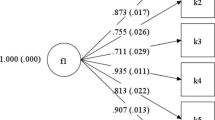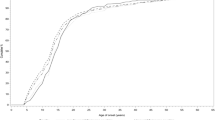Abstract
Background and aims
Various studies assessed mental disorders and psychological symptoms following natural disasters, including earthquakes. Yet, samples were often non-representative, and the periods of time between earthquake and assessments were usually short. This study aims to assess the prevalence of mental disorders, level of psychological symptoms and subjective quality of life in a random sample in a rural region in Italy 8 years after an earthquake.
Methods
Using a random sampling method, a pool of potential participants of working age who had experienced the earthquake were identified 8 years after the earthquake. They were sequentially approached until the target sample of 200 was reached. Mental disorders were assessed on the MINI, psychological symptoms on the Brief Symptom Inventory (BSI) and the Impact of Event Scale-Revised (IES-R), and subjective quality of life on the Manchester Short Assessment of Quality of Life (MANSA).
Results
200 people were interviewed, and the response rate of contacted people was 43%. In the MINI, 15 participants (7.5%) had any type of mental disorder; 5 participants had PTSD at any time since the earthquake, and 1 participant at the time of the interview. Symptom levels were low (Global Severity Index of BSI mean = 0.29, SD = 0.30; IES total mean = 0.40, SD = 3.33) and subjective quality of life (MANSA mean = 5.26, SD = 0.59) was in a positive range. The distribution of mental health outcomes made it difficult to explore factors associated with them.
Conclusion
There is no evidence that the earthquake had a negative impact on the mental health of the affected population years later. Possible reasons include the relatively weak nature of the earthquake, strong community support that helped overcome mental distress, the long period of time (8 years) between the occurrence of the earthquake and the study, and a capacity of people to maintain or restore mental health after a natural disaster in the long term.
Similar content being viewed by others
References
American Psychiatric Association (1994) Diagnostic and statistical manual of mental disorders, 4th edn. American Psychiatric Association, Washington, DC
Armenian HK, Morikawa M, Melkonian AK, Hovanesian AP, Haroutunian N, Saigh PA, Akiskal K, Akiskal H (2000) Loss as a determinant of PTSD in a cohort of adult survivors of the 1988 earthquake in Armenia: implications for policy. Acta Psychiatr Scand 102:58–64
Bland S, Valoroso L, Stranges S, Strazzullo P, Farinaro E, Trevisan M (2005) Long-term follow-up of psychological distress following earthquake experiences among working Italian males: a cross-sectional analysis. J Nerv Ment Dis 193(6):420–423
Bödvarsdottir I, Elklit A (2004) Psychological reactions in Icelandic earthquake survivors. Scand J Psychol 45(1):3–13
Boscarino JA, Adams RE (2009) PTSD onset and course following the World Trade Center disaster: findings and implications for future research. Soc Psychiatry Psychiatr Epidemiol 44(10):887–898
Carr VJ, Lewin TJ, Webster RA, Kenardy JA, Hazell PL, Carter GL (1997) Psychosocial sequelae of the 1989 Newcastle earthquake, II: exposure and morbidity profiles during the first 2 years post-disaster. Psychol Med 27:167–178
Catapano F, Malafronte R, Lepre F, Cozzolino P, Arnone R, Lorenzo E, Tartaglia G, Starace F, Magliano L, Maj M (2001) Psychological consequences of the 1998 landslide in Sarno, Italy: a community study. Acta Psychiatr Scand 104:438–442
Chang CM, Connor KM, Lai TJ, Lee LC, Davidson JR (2005) Predictors of posttraumatic outcomes following the 1999 Taiwan earthquake. J Nerv Ment Dis 193(1):40–46
D’Ardenne P, Capuzzo N, Fakhoury W, Gvrilovic J, Priebe S (2005) Subjective quality of life and posttraumatic stress disorder. J Nerv Ment Dis 193:62–65
Derogatis LR, Melisaratos N (1993) The brief symptom inventory: an introductory report. Psychol Med 13(3):595–605
De Girolamo G, Polidoro G, Morosini P, Scarpino V, Reda V, Serra G, Mazzi F et al (2006) Prevalence of common mental disorders in Italy: results from the European study of the epidemiology of mental disorders (EDEMeD). Soc Psychiatry Psychiatr Epidemiol 41:853–861
Faravelli C, Abrardi L, Bartolozzi D, Cecchi C, Cosci F, D’Adamo D, Lo Iacono B, Ravaldi C, Scarpato MA, Truglia E, Rossi PM, Rosi S (2004) The Sesto Fiorentino study: point and one-year prevalence of psychiatric disorders in an Italian community sample using clinical interviewers. Psychother Psychosom 73:226–234
Fazel M, Wheeler J, Danesh J (2005) Prevalence of serious mental disorder in 7000 refugees resettled in western countries: a systematic review. Lancet 15:1309–1314
Gavrilovic J (2006) Reasons for not seeking treatment in refugees with posttraumatic stress. MD thesis, Queen Mary University of London
Gavrilovic JJ, Lecic-Tosevski D, Colovic O, Dimic S, Susic V, Pejovic-Milovancevic M, Deusic SP, Priebe S (2005) Association of posttraumatic stress and quality of life in civilians after air attacks. Psychiatry 37(2):297–305
Goenjan AK, Najarian LM, Pynoos RS, Steinberg AM, Manoukian G, Tavosian A, Fairbank LA (1994) Posttraumatic stress disorder in elderly and younger adults after the 1988 earthquake in Armenia. Am J Psychiatry 151:895–901
Kadri N, Agoub M, El Gnaoui S, Alami KM, Hergueta T, Moussaoui D (2005) Moroccan colloquial Arabic version of the Mini International Neuropsychiatric Interview (MINI): qualitative and quantitative validation. Eur Psychiatry 20(2):93–195
Karanci AN, Rustemli A (1995) Psychological consequences of the 1992 Erzican (Turkey) earthquake. Disasters 19:8–18
Kato H, Asukai N, Miyake Y, Minakawa K, Nishiyama A (1996) Post-traumatic symptoms among younger and elderly evacuees in the early stages following the 1995 Hanhin-Awaji earthquake in Japan. Acta Psyciatr Scand 93:477–481
Kessler RC, Little R, Groves RM (1995) Advances in strategies for minimizing and adjusting for survey non-response. Epidemiol Rev 17:192–204
Lai TJ, Chang CM, Connor KM, Lee LC, Davidson JR (2004) Full and partial PTSD among earthquake survivors in rural Taiwan. J Psychiatr Res 38(3):313–322
Lecrubier Y, Sheehan DV, Weiller E, Amorim P, Bonora I, Sheehan KH, Janavs J, Dunbar GC (1997) The MINI International Neuropsychiatric Interview (M.I.N.I.). A short diagnostic structured interview: reliability and validity according to the CIDI. Eur Psychiatry 12(5):224–231
Lee C, Chang J, Liu C, Chang C, Chen T, Chen C, Cheng A (2009) Acculturation, psychiatric comorbidity and posttraumatic stress disorder in a Taiwanese aboriginal population. Soc Psychiatry Psychiatr Epidemiol 44(1):55–62
Lewin TJ, Carr VJ, Webster RA (1998) Recovery from post-earthquake psychological morbidity: who suffers and who recovers? Aust N Z J Psychiatry 32(1):15–20
Livanou M, Kasvikis Y, Basoglu M, Mytskidou P, Sotiropoulou V, Spanea E, Mitsopopoulou T, Voutsa N (2005) Earthquake-related psychological distress and associated factors 4 years after the Parnithia earthquake in Greece. Eur Psychiatry 20:137–144
Mollica RF, Caridad KR, Massagli MP (2007) Longitudinal study of posttraumatic stress disorder, depression, and changes in traumatic memories over time in Bosnian refugees. J Nerv Ment Dis 195:572–579
Montazeri A, Baradaran H, Omidvari S, Azin SA, Ebadi M, Garmaroudi G, Harirchi AM, Shariati M (2005) Psychological distress among Bam earthquake survivors in Iran: a population-based study. BMC Public Health 11:4–5
Nolen-Hoeksema S, Morrow J (1991) A prospective study of depression and post-traumatic stress symptoms after a natural disaster: the 1989 Loma Prieta earthquake. J Pers Soc Psychol 6:115–121
Oliver JPJ, Huxley PJ, Priebe S, Kaiser W (1997) Measuring the quality of life of severely mentally ill people using the Lancashire Quality of Life Profile. Soc Psychiatry Psychiatr Epidemiol 32:76–83
Önder E, Tural Ü, Aker T, Kiliç C, Erdoğan S (2006) Prevalence of psychiatric disorders three years after the 1999 earthquake in Turkey: Marmara Earthquake Survey (MES). Soc Psychiatry Psychiatr Epidemiol 41:868–874
Otsubo T, Tanaka K, Koda R, Shinoda J, Sano N, Tanaka S, Aoyama H, Mimura M, Kamijima K (2005) Reliability and validity of Japanese version of the Mini-International Neuropsychiatric Interview. Psychiatry Clin Neurosci 59(5):517–526
Peen J, Dekker J, Schoevers RA, ten Have M, Graaf R, Beekman AT (2007) Is the prevalence of psychiatric disorders associated with urbanization? Soc Psychiatry Psychiatr Epidemiol 42:984–989
Priebe S, Bogic M, Ajdukovic D, Franciskovic T, Galeazzi GM, Kucukalic A, Lecic-Tosevski D, Morina N, Popovski M, Wang D, Schützwohl M (2010) Mental disorders following, war in the Balkans: a study in five countries. Archives of General Psychiatry (in press)
Priebe S, Gavrilovic JJ, Schuetzwohl M, Galeazzi GM, Lecic-Tosevski M, Ajdukovic D, Franciskovic T, Kucukalic A, Popovski M (2002) A study of long-term clinical and social outcomes after war experiences in ex-Yugoslavia—methods of the ‘CONNECT’ project. Psychiatry Today 36:101–122
Priebe S, Grappasonni I, Mari M, Dewey M, Petrelli F, Costa A (2009) Post-traumatic stress disorder six months after an earthquake: findings from a community sample in a rural region in Italy. Soc Psychiatry Psychiatr Epidemiol 44(5):393–397
Priebe S, Huxley P, Knight S, Evans S (1999) Application and results of the Manchester Short Assessment of Quality of Life (MANSA). Int J Psychiatry 45:7–12
Rossi A, Alberio R, Porta A, Sandri M, Tansella M, Amaddeo F (2004) The reliability of the Mini-International Neuropsychiatric Interview-Italian Version. JCP 24(5):561–563
Sheehan DV, Lecrubier Y, Harnett-Sheehan K, Janavs J, Weiller E, Bonora LI, Keskiner A, Schinka J, Knapp E, Sheehan MF, Dunbar GC (1997) Reliability and validity of the MINI International Neuropsychiatric Interview (M.I.N.I.): according to the SCID-P. Eur Psychiatry 12(5):232–241
Sheehan DV, Lecrubier Y, Sheehan KH, Amorim P, Janavs J, Weiller E, Hergueta T, Baker R, Dunbar GC (1998) Mini-International Neuropsychiatric Interview (M.I.N.I.): the development and validation of a structured diagnostic psychiatric interview for DSM-IV and ICD-10. J Clin Psychiatry 59(Suppl 20):22–33
Southwick SM, Morgan CA, Nicolaou AL, Charney DS (1997) Consistency of memory for combat-related traumatic events in veterans of Operation Desert Storm. Am J Psychiatry 154:173–177
Weiss DS (2007) The impact of event scale: revised. In: Wilson JP, Tang C (eds) Cross-cultural assessment of psychological trauma and PTSD. Guilford, New York, pp 219–238
Wolfe J, Kimerling R (1997) Gender issues in the assessment of posttraumatic stress disorder. In: Wilson J, Keane TM (eds) Assessing psychological trauma and PTSD. Guilford, New York, pp 192–238
Acknowledgments
We thank Dr Iolanda Grappasonni and Dr Fabio Petrelli from the University of Camerino (Italy) and Dr Massimo Mari from the Department of Mental Health at Jesi (Italy) for their support of the study.
Author information
Authors and Affiliations
Corresponding author
Rights and permissions
About this article
Cite this article
Priebe, S., Marchi, F., Bini, L. et al. Mental disorders, psychological symptoms and quality of life 8 years after an earthquake: findings from a community sample in Italy. Soc Psychiatry Psychiatr Epidemiol 46, 615–621 (2011). https://doi.org/10.1007/s00127-010-0227-x
Received:
Accepted:
Published:
Issue Date:
DOI: https://doi.org/10.1007/s00127-010-0227-x




